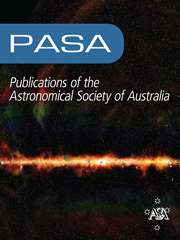No CrossRef data available.
Article contents
Induced Three-wave Interactions in Eclipsing Pulsars
Published online by Cambridge University Press: 25 April 2016
Abstract
Three-wave interactions involving two high-frequency waves (in the same mode) and a low-frequency wave are discussed and applied to pulsar eclipses. When the magnetic field is taken into account, the low-frequency waves can be the ω-mode (the low-frequency branch of the ordinary mode) or the z-mode (the low-frequency branch of the extraordinary mode). It is shown that in the cold plasma approximation, effective growth of the low-frequency waves due to an anisotropic photon beam can occur only for z-mode waves near the resonance frequency. In the application to pulsar eclipses, the cold plasma approximation may not be adequate and we suggest that when thermal effects are included, three-wave interaction involving low-frequency cyclotron waves (e.g. Bernstein modes) is a plausible candidate for pulsar eclipses
Information
- Type
- Gallactic and Stellar
- Information
- Publications of the Astronomical Society of Australia , Volume 12 , Issue 1 , April 1995 , pp. 71 - 75
- Copyright
- Copyright © Astronomical Society of Australia 1995

